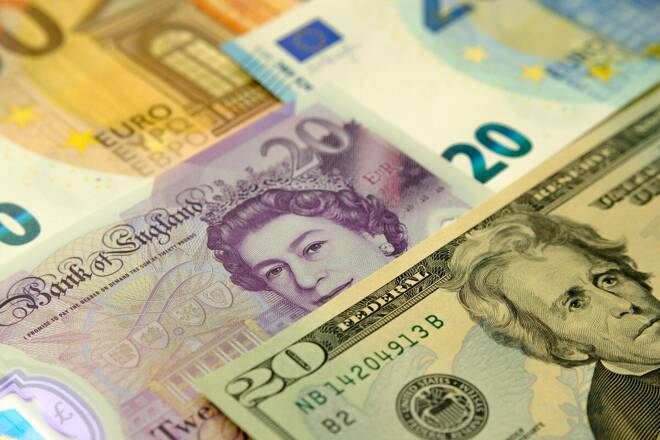Advertisement
Advertisement
GBP to USD Forecast: How Sterling Navigates UK Growth and US Inflation Reports
By:
British Pound's movement hinges on upcoming UK GDP and US CPI reports and the Bank of England Chief Economist's stance on monetary policy.
Highlights
- The GBP/USD pair saw an ascent of 0.22% on Wednesday, following Tuesday’s 0.40% rise.
- UK’s August GDP forecast: 0.2% growth. A rebound from July’s 0.5% contraction.
- US CPI Report’s potential impact: A hotter outcome could reignite Fed’s rate hike talks.
Overview of the Wednesday Session
On Wednesday, the GBP/USD gained 0.22%. Following a 0.40% rise on Tuesday, the GBP/USD pair ended the day at $1.23129. The GBP to USD pair fell to a low of $1.22680 before climbing to a high of $1.23374.
UK GDP Report and BoE Chief Economist Huw Pill in Focus
The UK Monthly GDP Estimate Report will garner investor interest on Thursday. Economists forecast the UK economy to expand by 0.2% in August vs. a 0.5% contraction in July.
The subcomponents also need consideration. Household consumption and services sector growth will likely be focal points. UK private consumption contributes over 60% to the UK GDP. Significantly, the services sector accounts for more than 75% of the UK economy.
Beyond the numbers, Bank of England (BoE) Chief Economist Huw Pill is on the BoE Calendar to speak today. Monetary Policy Committee member Catherine Mann discussed longer inflation on Monday and the need for more aggressive policy measures. A similar view from Huw Pill would support the GBP/USD.
US CPI Report in the Spotlight
The US CPI Report will also influence to the GBP/USD pair. A hotter-than-expected US CPI Report will likely relight the Fed rate hike debate and appetite for the US dollar.
Economists forecast the US annual inflation rate to soften from 3.7% to 3.6% in September. Core inflation also needs consideration. Economists predict core inflation to ease from 4.3% to 4.1%.
With inflation in the spotlight, the weekly jobless claims will likely have a limited impact on the pairing. Economists forecast initial jobless claims to rise from 207k to 210k in the week ending October 6.
Beyond the numbers, FOMC member Raphael Bostic is on the economic calendar to speak. A shift from recently dovish comments would warrant consideration. However, news updates from the Middle East conflict could materially influence market risk sentiment.
Short-Term Forecast
Near-term trends for the GBP/USD hinge on the UK GDP and US CPI reports. Weaker-than-expected UK growth and a hotter-than-expected US annual inflation rate would pressure the GBP/USD pair. An escalation in the Middle East conflict would fuel demand for the US dollar as a safe haven currency.
GBP to USD Price Action
Daily Chart
The GBP/USD pair sat below the 50-day and 200-day EMAs, sending bearish price signals.
The UK GDP Report and the US CPI Report will be the focal points on Thursday. A hotter-than-expected US CPI Report would likely counter a better-than-expected UK GDP Monthly Report.
A GBP/USD return to $1.2350 would give the bulls a run at the EMAs and $1.24410 resistance level.
However, a disappointing GDP report and a pickup in US inflationary pressure would support a move toward the $1.22150 support level.
The 14-period daily RSI reading of 50.02 supports a GBP/USD move to the 50-day EMA before entering overbought territory.
4-Hourly Chart
The GBP/USD sits above the 50-day EMA while remaining below the 200-day EMA, sending bullish near-term but bearish longer-term price signals. A GBP/USD break above the 200-day EMA would support a move toward the $1.24410 resistance level.
However, a fall through the 50-day EMA and $1.22150 support level would give the bears a run at $1.21500.
With an RSI reading of 63.77 for the 14-period 4-hourly Chart, the GBP/USD could break above the 200-day EMA before entering overbought territory.
About the Author
Bob Masonauthor
With over 28 years of experience in the financial industry, Bob has worked with various global rating agencies and multinational banks. Currently he is covering currencies, commodities, alternative asset classes and global equities, focusing mostly on European and Asian markets.
Advertisement
